International Law and Genocide: Australia's Obligations and Self-Determination Issues
VerifiedAdded on 2023/06/05
|10
|3032
|338
AI Summary
This paper examines what constitutes genocide and the position of the ban on genocide under international law; international law practices based on Aboriginal Ordinance; Australia’s obligation under international on crime of genocide and finally the self-determination issues under the “Stolen Generation”.
Contribute Materials
Your contribution can guide someone’s learning journey. Share your
documents today.
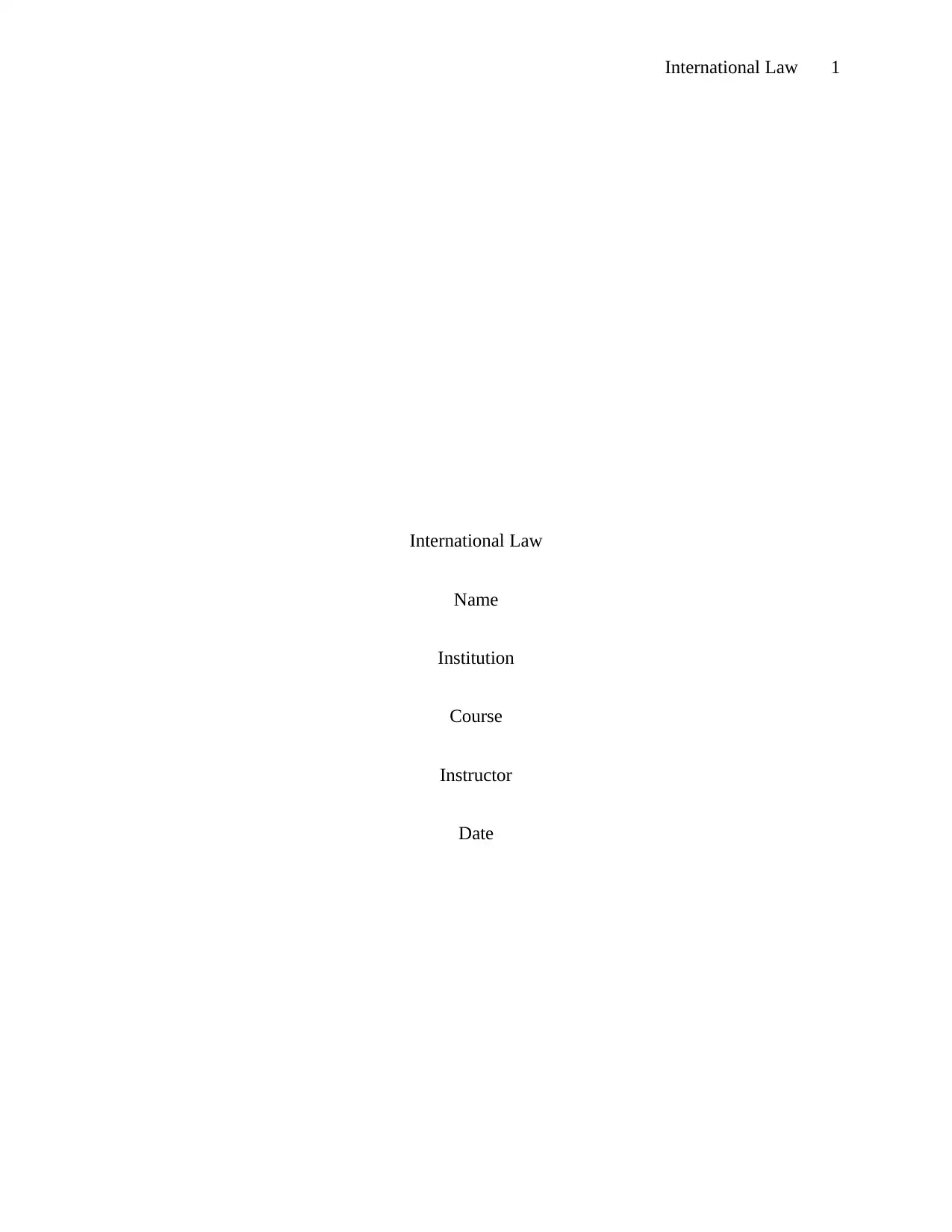
International Law 1
International Law
Name
Institution
Course
Instructor
Date
International Law
Name
Institution
Course
Instructor
Date
Secure Best Marks with AI Grader
Need help grading? Try our AI Grader for instant feedback on your assignments.
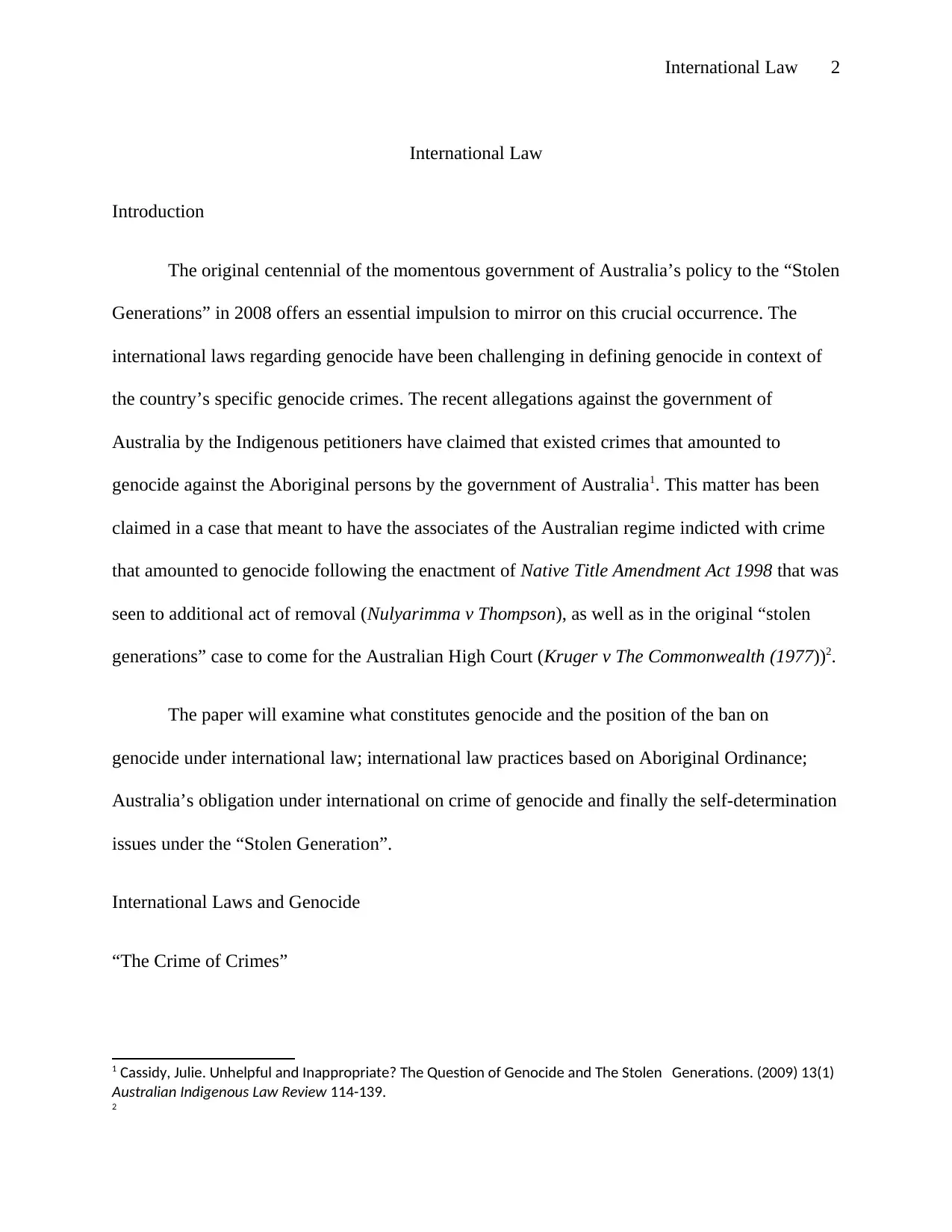
International Law 2
International Law
Introduction
The original centennial of the momentous government of Australia’s policy to the “Stolen
Generations” in 2008 offers an essential impulsion to mirror on this crucial occurrence. The
international laws regarding genocide have been challenging in defining genocide in context of
the country’s specific genocide crimes. The recent allegations against the government of
Australia by the Indigenous petitioners have claimed that existed crimes that amounted to
genocide against the Aboriginal persons by the government of Australia1. This matter has been
claimed in a case that meant to have the associates of the Australian regime indicted with crime
that amounted to genocide following the enactment of Native Title Amendment Act 1998 that was
seen to additional act of removal (Nulyarimma v Thompson), as well as in the original “stolen
generations” case to come for the Australian High Court (Kruger v The Commonwealth (1977))2.
The paper will examine what constitutes genocide and the position of the ban on
genocide under international law; international law practices based on Aboriginal Ordinance;
Australia’s obligation under international on crime of genocide and finally the self-determination
issues under the “Stolen Generation”.
International Laws and Genocide
“The Crime of Crimes”
1 Cassidy, Julie. Unhelpful and Inappropriate? The Question of Genocide and The Stolen Generations. (2009) 13(1)
Australian Indigenous Law Review 114-139.
2
International Law
Introduction
The original centennial of the momentous government of Australia’s policy to the “Stolen
Generations” in 2008 offers an essential impulsion to mirror on this crucial occurrence. The
international laws regarding genocide have been challenging in defining genocide in context of
the country’s specific genocide crimes. The recent allegations against the government of
Australia by the Indigenous petitioners have claimed that existed crimes that amounted to
genocide against the Aboriginal persons by the government of Australia1. This matter has been
claimed in a case that meant to have the associates of the Australian regime indicted with crime
that amounted to genocide following the enactment of Native Title Amendment Act 1998 that was
seen to additional act of removal (Nulyarimma v Thompson), as well as in the original “stolen
generations” case to come for the Australian High Court (Kruger v The Commonwealth (1977))2.
The paper will examine what constitutes genocide and the position of the ban on
genocide under international law; international law practices based on Aboriginal Ordinance;
Australia’s obligation under international on crime of genocide and finally the self-determination
issues under the “Stolen Generation”.
International Laws and Genocide
“The Crime of Crimes”
1 Cassidy, Julie. Unhelpful and Inappropriate? The Question of Genocide and The Stolen Generations. (2009) 13(1)
Australian Indigenous Law Review 114-139.
2
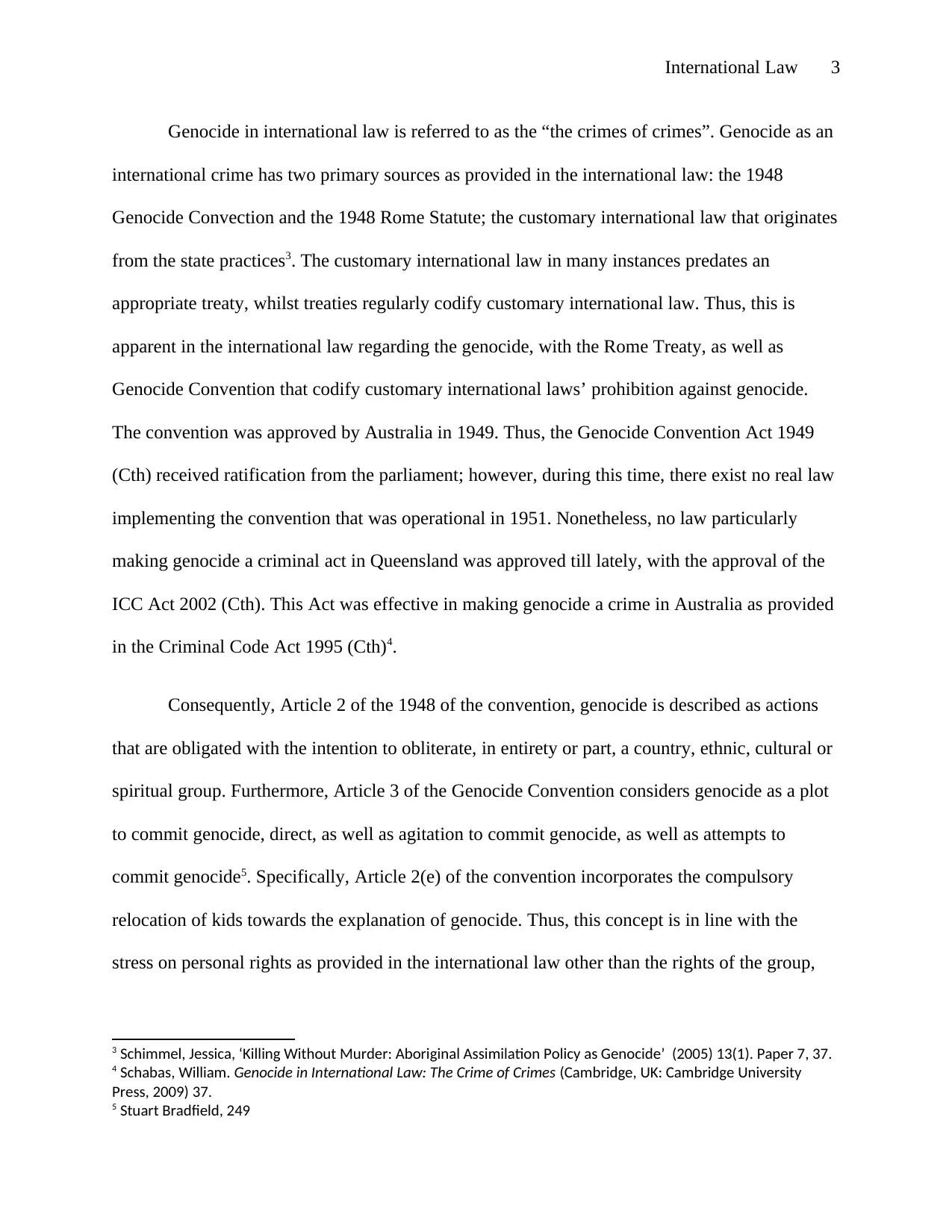
International Law 3
Genocide in international law is referred to as the “the crimes of crimes”. Genocide as an
international crime has two primary sources as provided in the international law: the 1948
Genocide Convection and the 1948 Rome Statute; the customary international law that originates
from the state practices3. The customary international law in many instances predates an
appropriate treaty, whilst treaties regularly codify customary international law. Thus, this is
apparent in the international law regarding the genocide, with the Rome Treaty, as well as
Genocide Convention that codify customary international laws’ prohibition against genocide.
The convention was approved by Australia in 1949. Thus, the Genocide Convention Act 1949
(Cth) received ratification from the parliament; however, during this time, there exist no real law
implementing the convention that was operational in 1951. Nonetheless, no law particularly
making genocide a criminal act in Queensland was approved till lately, with the approval of the
ICC Act 2002 (Cth). This Act was effective in making genocide a crime in Australia as provided
in the Criminal Code Act 1995 (Cth)4.
Consequently, Article 2 of the 1948 of the convention, genocide is described as actions
that are obligated with the intention to obliterate, in entirety or part, a country, ethnic, cultural or
spiritual group. Furthermore, Article 3 of the Genocide Convention considers genocide as a plot
to commit genocide, direct, as well as agitation to commit genocide, as well as attempts to
commit genocide5. Specifically, Article 2(e) of the convention incorporates the compulsory
relocation of kids towards the explanation of genocide. Thus, this concept is in line with the
stress on personal rights as provided in the international law other than the rights of the group,
3 Schimmel, Jessica, ‘Killing Without Murder: Aboriginal Assimilation Policy as Genocide’ (2005) 13(1). Paper 7, 37.
4 Schabas, William. Genocide in International Law: The Crime of Crimes (Cambridge, UK: Cambridge University
Press, 2009) 37.
5 Stuart Bradfield, 249
Genocide in international law is referred to as the “the crimes of crimes”. Genocide as an
international crime has two primary sources as provided in the international law: the 1948
Genocide Convection and the 1948 Rome Statute; the customary international law that originates
from the state practices3. The customary international law in many instances predates an
appropriate treaty, whilst treaties regularly codify customary international law. Thus, this is
apparent in the international law regarding the genocide, with the Rome Treaty, as well as
Genocide Convention that codify customary international laws’ prohibition against genocide.
The convention was approved by Australia in 1949. Thus, the Genocide Convention Act 1949
(Cth) received ratification from the parliament; however, during this time, there exist no real law
implementing the convention that was operational in 1951. Nonetheless, no law particularly
making genocide a criminal act in Queensland was approved till lately, with the approval of the
ICC Act 2002 (Cth). This Act was effective in making genocide a crime in Australia as provided
in the Criminal Code Act 1995 (Cth)4.
Consequently, Article 2 of the 1948 of the convention, genocide is described as actions
that are obligated with the intention to obliterate, in entirety or part, a country, ethnic, cultural or
spiritual group. Furthermore, Article 3 of the Genocide Convention considers genocide as a plot
to commit genocide, direct, as well as agitation to commit genocide, as well as attempts to
commit genocide5. Specifically, Article 2(e) of the convention incorporates the compulsory
relocation of kids towards the explanation of genocide. Thus, this concept is in line with the
stress on personal rights as provided in the international law other than the rights of the group,
3 Schimmel, Jessica, ‘Killing Without Murder: Aboriginal Assimilation Policy as Genocide’ (2005) 13(1). Paper 7, 37.
4 Schabas, William. Genocide in International Law: The Crime of Crimes (Cambridge, UK: Cambridge University
Press, 2009) 37.
5 Stuart Bradfield, 249
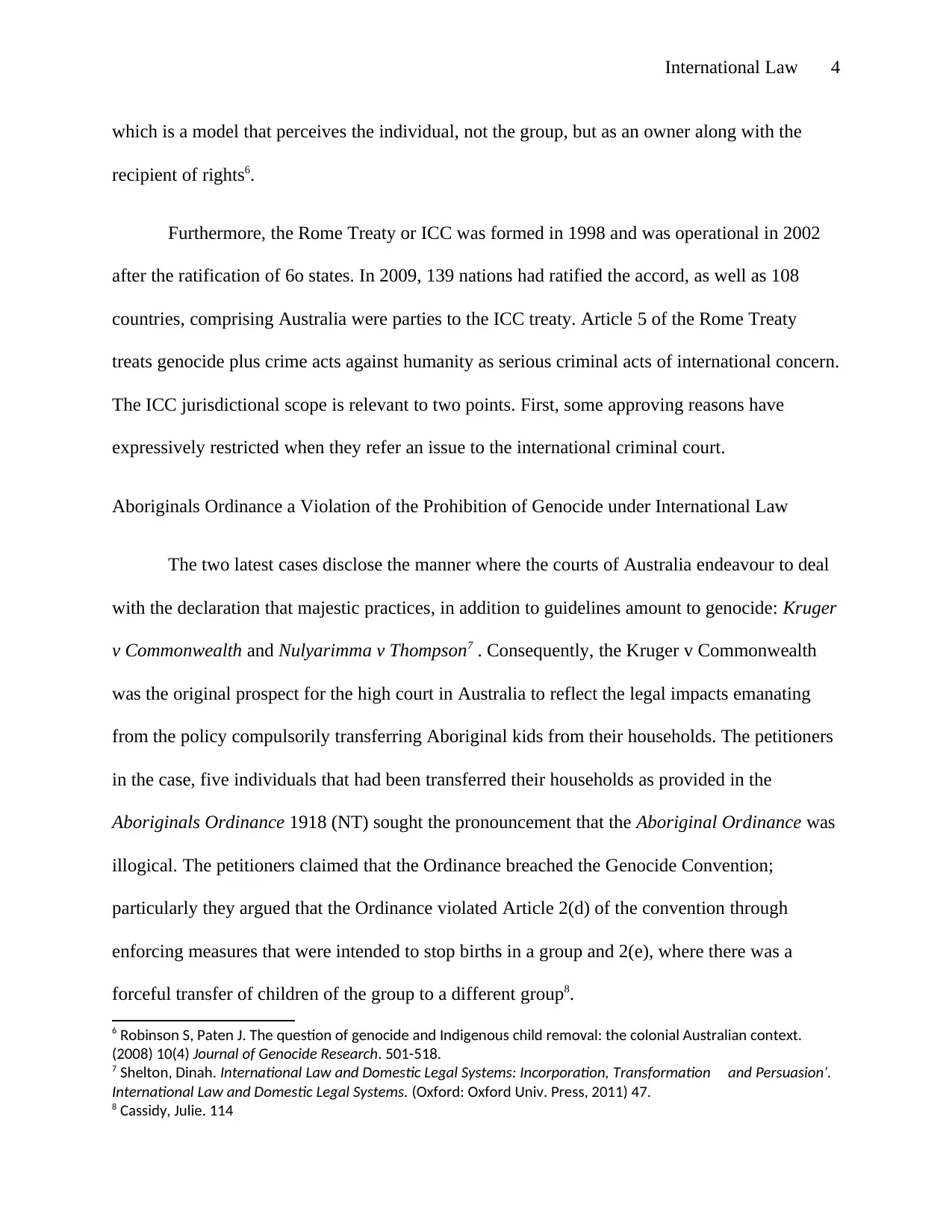
International Law 4
which is a model that perceives the individual, not the group, but as an owner along with the
recipient of rights6.
Furthermore, the Rome Treaty or ICC was formed in 1998 and was operational in 2002
after the ratification of 6o states. In 2009, 139 nations had ratified the accord, as well as 108
countries, comprising Australia were parties to the ICC treaty. Article 5 of the Rome Treaty
treats genocide plus crime acts against humanity as serious criminal acts of international concern.
The ICC jurisdictional scope is relevant to two points. First, some approving reasons have
expressively restricted when they refer an issue to the international criminal court.
Aboriginals Ordinance a Violation of the Prohibition of Genocide under International Law
The two latest cases disclose the manner where the courts of Australia endeavour to deal
with the declaration that majestic practices, in addition to guidelines amount to genocide: Kruger
v Commonwealth and Nulyarimma v Thompson7 . Consequently, the Kruger v Commonwealth
was the original prospect for the high court in Australia to reflect the legal impacts emanating
from the policy compulsorily transferring Aboriginal kids from their households. The petitioners
in the case, five individuals that had been transferred their households as provided in the
Aboriginals Ordinance 1918 (NT) sought the pronouncement that the Aboriginal Ordinance was
illogical. The petitioners claimed that the Ordinance breached the Genocide Convention;
particularly they argued that the Ordinance violated Article 2(d) of the convention through
enforcing measures that were intended to stop births in a group and 2(e), where there was a
forceful transfer of children of the group to a different group8.
6 Robinson S, Paten J. The question of genocide and Indigenous child removal: the colonial Australian context.
(2008) 10(4) Journal of Genocide Research. 501-518.
7 Shelton, Dinah. International Law and Domestic Legal Systems: Incorporation, Transformation and Persuasion’.
International Law and Domestic Legal Systems. (Oxford: Oxford Univ. Press, 2011) 47.
8 Cassidy, Julie. 114
which is a model that perceives the individual, not the group, but as an owner along with the
recipient of rights6.
Furthermore, the Rome Treaty or ICC was formed in 1998 and was operational in 2002
after the ratification of 6o states. In 2009, 139 nations had ratified the accord, as well as 108
countries, comprising Australia were parties to the ICC treaty. Article 5 of the Rome Treaty
treats genocide plus crime acts against humanity as serious criminal acts of international concern.
The ICC jurisdictional scope is relevant to two points. First, some approving reasons have
expressively restricted when they refer an issue to the international criminal court.
Aboriginals Ordinance a Violation of the Prohibition of Genocide under International Law
The two latest cases disclose the manner where the courts of Australia endeavour to deal
with the declaration that majestic practices, in addition to guidelines amount to genocide: Kruger
v Commonwealth and Nulyarimma v Thompson7 . Consequently, the Kruger v Commonwealth
was the original prospect for the high court in Australia to reflect the legal impacts emanating
from the policy compulsorily transferring Aboriginal kids from their households. The petitioners
in the case, five individuals that had been transferred their households as provided in the
Aboriginals Ordinance 1918 (NT) sought the pronouncement that the Aboriginal Ordinance was
illogical. The petitioners claimed that the Ordinance breached the Genocide Convention;
particularly they argued that the Ordinance violated Article 2(d) of the convention through
enforcing measures that were intended to stop births in a group and 2(e), where there was a
forceful transfer of children of the group to a different group8.
6 Robinson S, Paten J. The question of genocide and Indigenous child removal: the colonial Australian context.
(2008) 10(4) Journal of Genocide Research. 501-518.
7 Shelton, Dinah. International Law and Domestic Legal Systems: Incorporation, Transformation and Persuasion’.
International Law and Domestic Legal Systems. (Oxford: Oxford Univ. Press, 2011) 47.
8 Cassidy, Julie. 114
Secure Best Marks with AI Grader
Need help grading? Try our AI Grader for instant feedback on your assignments.
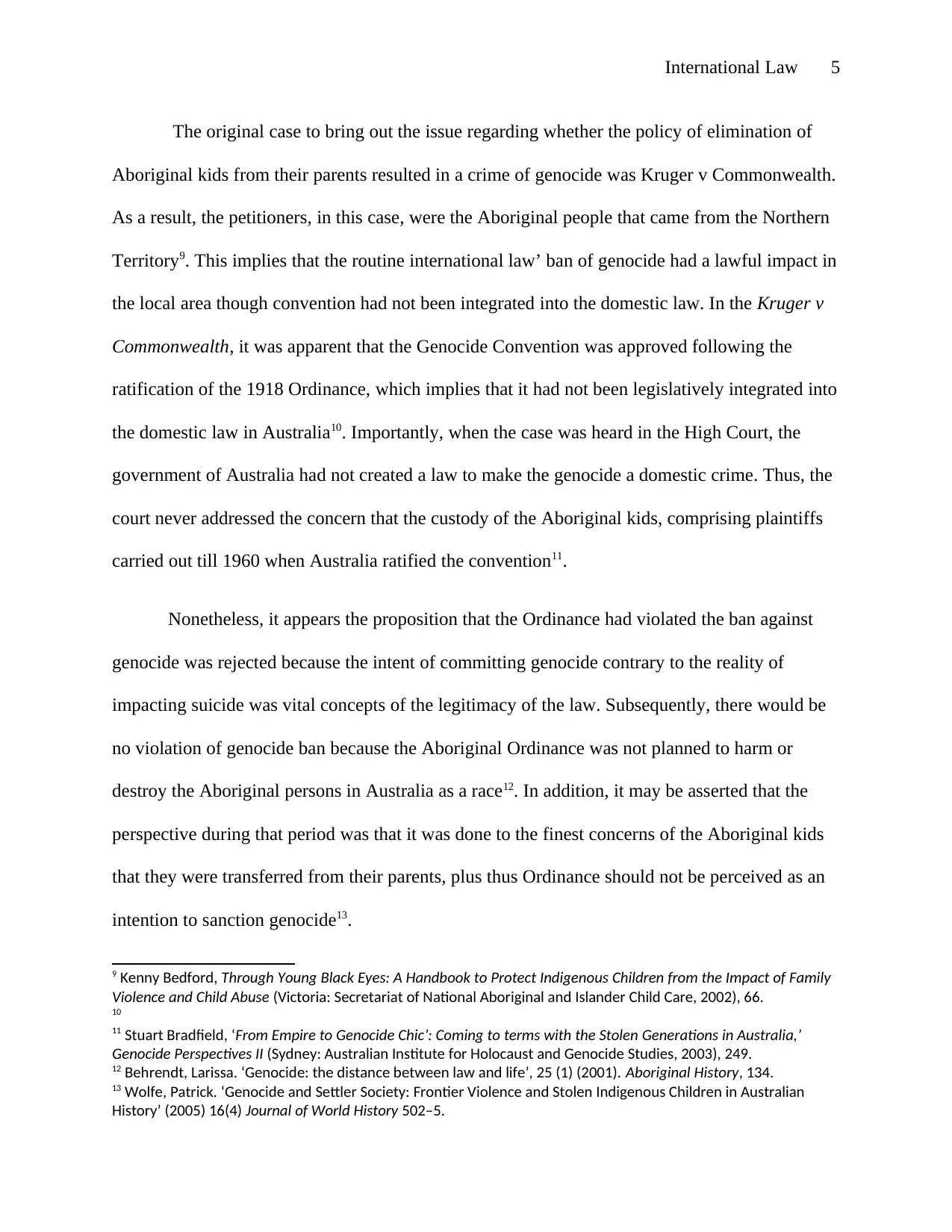
International Law 5
The original case to bring out the issue regarding whether the policy of elimination of
Aboriginal kids from their parents resulted in a crime of genocide was Kruger v Commonwealth.
As a result, the petitioners, in this case, were the Aboriginal people that came from the Northern
Territory9. This implies that the routine international law’ ban of genocide had a lawful impact in
the local area though convention had not been integrated into the domestic law. In the Kruger v
Commonwealth, it was apparent that the Genocide Convention was approved following the
ratification of the 1918 Ordinance, which implies that it had not been legislatively integrated into
the domestic law in Australia10. Importantly, when the case was heard in the High Court, the
government of Australia had not created a law to make the genocide a domestic crime. Thus, the
court never addressed the concern that the custody of the Aboriginal kids, comprising plaintiffs
carried out till 1960 when Australia ratified the convention11.
Nonetheless, it appears the proposition that the Ordinance had violated the ban against
genocide was rejected because the intent of committing genocide contrary to the reality of
impacting suicide was vital concepts of the legitimacy of the law. Subsequently, there would be
no violation of genocide ban because the Aboriginal Ordinance was not planned to harm or
destroy the Aboriginal persons in Australia as a race12. In addition, it may be asserted that the
perspective during that period was that it was done to the finest concerns of the Aboriginal kids
that they were transferred from their parents, plus thus Ordinance should not be perceived as an
intention to sanction genocide13.
9 Kenny Bedford, Through Young Black Eyes: A Handbook to Protect Indigenous Children from the Impact of Family
Violence and Child Abuse (Victoria: Secretariat of National Aboriginal and Islander Child Care, 2002), 66.
10
11 Stuart Bradfield, ‘From Empire to Genocide Chic’: Coming to terms with the Stolen Generations in Australia,’
Genocide Perspectives II (Sydney: Australian Institute for Holocaust and Genocide Studies, 2003), 249.
12 Behrendt, Larissa. ‘Genocide: the distance between law and life’, 25 (1) (2001). Aboriginal History, 134.
13 Wolfe, Patrick. ‘Genocide and Settler Society: Frontier Violence and Stolen Indigenous Children in Australian
History’ (2005) 16(4) Journal of World History 502–5.
The original case to bring out the issue regarding whether the policy of elimination of
Aboriginal kids from their parents resulted in a crime of genocide was Kruger v Commonwealth.
As a result, the petitioners, in this case, were the Aboriginal people that came from the Northern
Territory9. This implies that the routine international law’ ban of genocide had a lawful impact in
the local area though convention had not been integrated into the domestic law. In the Kruger v
Commonwealth, it was apparent that the Genocide Convention was approved following the
ratification of the 1918 Ordinance, which implies that it had not been legislatively integrated into
the domestic law in Australia10. Importantly, when the case was heard in the High Court, the
government of Australia had not created a law to make the genocide a domestic crime. Thus, the
court never addressed the concern that the custody of the Aboriginal kids, comprising plaintiffs
carried out till 1960 when Australia ratified the convention11.
Nonetheless, it appears the proposition that the Ordinance had violated the ban against
genocide was rejected because the intent of committing genocide contrary to the reality of
impacting suicide was vital concepts of the legitimacy of the law. Subsequently, there would be
no violation of genocide ban because the Aboriginal Ordinance was not planned to harm or
destroy the Aboriginal persons in Australia as a race12. In addition, it may be asserted that the
perspective during that period was that it was done to the finest concerns of the Aboriginal kids
that they were transferred from their parents, plus thus Ordinance should not be perceived as an
intention to sanction genocide13.
9 Kenny Bedford, Through Young Black Eyes: A Handbook to Protect Indigenous Children from the Impact of Family
Violence and Child Abuse (Victoria: Secretariat of National Aboriginal and Islander Child Care, 2002), 66.
10
11 Stuart Bradfield, ‘From Empire to Genocide Chic’: Coming to terms with the Stolen Generations in Australia,’
Genocide Perspectives II (Sydney: Australian Institute for Holocaust and Genocide Studies, 2003), 249.
12 Behrendt, Larissa. ‘Genocide: the distance between law and life’, 25 (1) (2001). Aboriginal History, 134.
13 Wolfe, Patrick. ‘Genocide and Settler Society: Frontier Violence and Stolen Indigenous Children in Australian
History’ (2005) 16(4) Journal of World History 502–5.
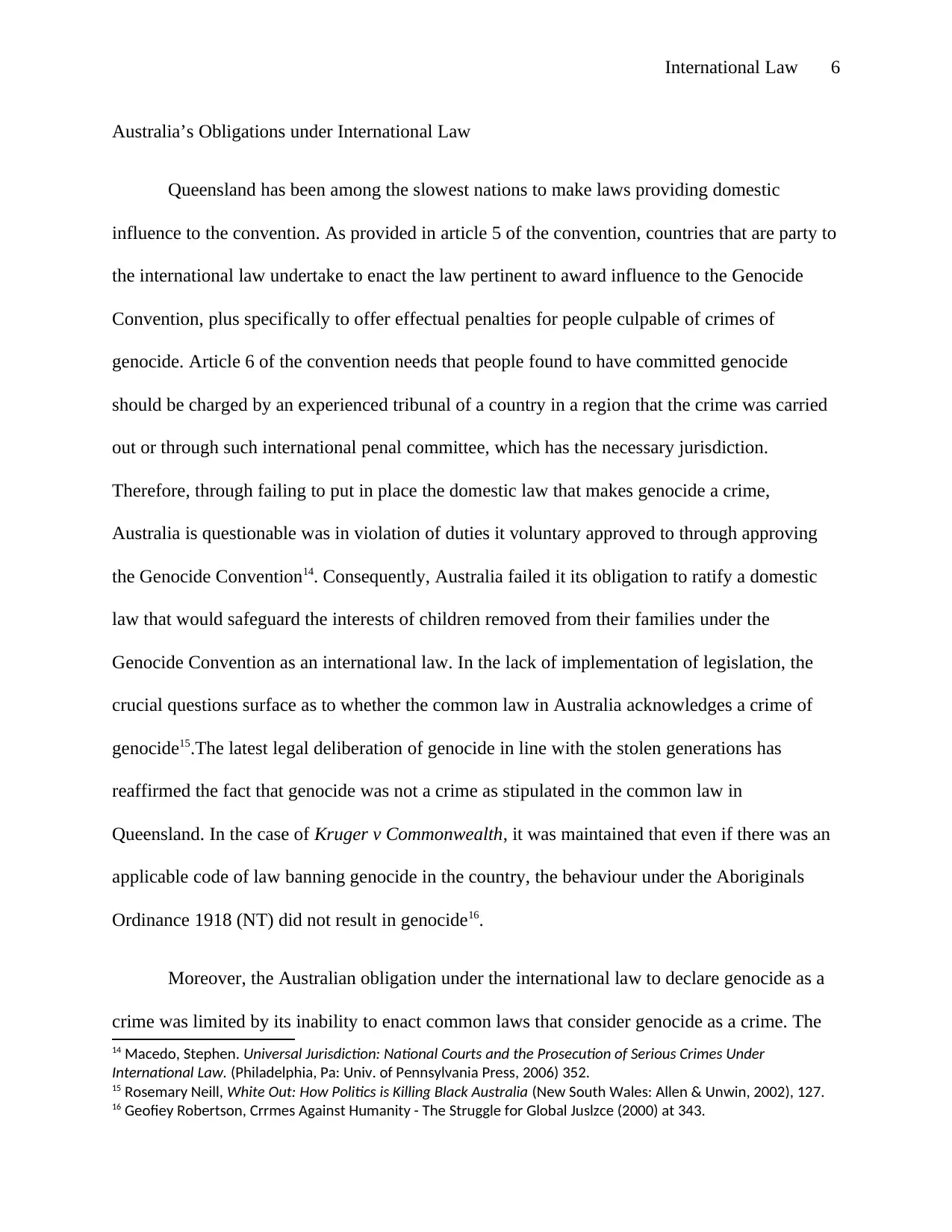
International Law 6
Australia’s Obligations under International Law
Queensland has been among the slowest nations to make laws providing domestic
influence to the convention. As provided in article 5 of the convention, countries that are party to
the international law undertake to enact the law pertinent to award influence to the Genocide
Convention, plus specifically to offer effectual penalties for people culpable of crimes of
genocide. Article 6 of the convention needs that people found to have committed genocide
should be charged by an experienced tribunal of a country in a region that the crime was carried
out or through such international penal committee, which has the necessary jurisdiction.
Therefore, through failing to put in place the domestic law that makes genocide a crime,
Australia is questionable was in violation of duties it voluntary approved to through approving
the Genocide Convention14. Consequently, Australia failed it its obligation to ratify a domestic
law that would safeguard the interests of children removed from their families under the
Genocide Convention as an international law. In the lack of implementation of legislation, the
crucial questions surface as to whether the common law in Australia acknowledges a crime of
genocide15.The latest legal deliberation of genocide in line with the stolen generations has
reaffirmed the fact that genocide was not a crime as stipulated in the common law in
Queensland. In the case of Kruger v Commonwealth, it was maintained that even if there was an
applicable code of law banning genocide in the country, the behaviour under the Aboriginals
Ordinance 1918 (NT) did not result in genocide16.
Moreover, the Australian obligation under the international law to declare genocide as a
crime was limited by its inability to enact common laws that consider genocide as a crime. The
14 Macedo, Stephen. Universal Jurisdiction: National Courts and the Prosecution of Serious Crimes Under
International Law. (Philadelphia, Pa: Univ. of Pennsylvania Press, 2006) 352.
15 Rosemary Neill, White Out: How Politics is Killing Black Australia (New South Wales: Allen & Unwin, 2002), 127.
16 Geofiey Robertson, Crrmes Against Humanity - The Struggle for Global Juslzce (2000) at 343.
Australia’s Obligations under International Law
Queensland has been among the slowest nations to make laws providing domestic
influence to the convention. As provided in article 5 of the convention, countries that are party to
the international law undertake to enact the law pertinent to award influence to the Genocide
Convention, plus specifically to offer effectual penalties for people culpable of crimes of
genocide. Article 6 of the convention needs that people found to have committed genocide
should be charged by an experienced tribunal of a country in a region that the crime was carried
out or through such international penal committee, which has the necessary jurisdiction.
Therefore, through failing to put in place the domestic law that makes genocide a crime,
Australia is questionable was in violation of duties it voluntary approved to through approving
the Genocide Convention14. Consequently, Australia failed it its obligation to ratify a domestic
law that would safeguard the interests of children removed from their families under the
Genocide Convention as an international law. In the lack of implementation of legislation, the
crucial questions surface as to whether the common law in Australia acknowledges a crime of
genocide15.The latest legal deliberation of genocide in line with the stolen generations has
reaffirmed the fact that genocide was not a crime as stipulated in the common law in
Queensland. In the case of Kruger v Commonwealth, it was maintained that even if there was an
applicable code of law banning genocide in the country, the behaviour under the Aboriginals
Ordinance 1918 (NT) did not result in genocide16.
Moreover, the Australian obligation under the international law to declare genocide as a
crime was limited by its inability to enact common laws that consider genocide as a crime. The
14 Macedo, Stephen. Universal Jurisdiction: National Courts and the Prosecution of Serious Crimes Under
International Law. (Philadelphia, Pa: Univ. of Pennsylvania Press, 2006) 352.
15 Rosemary Neill, White Out: How Politics is Killing Black Australia (New South Wales: Allen & Unwin, 2002), 127.
16 Geofiey Robertson, Crrmes Against Humanity - The Struggle for Global Juslzce (2000) at 343.
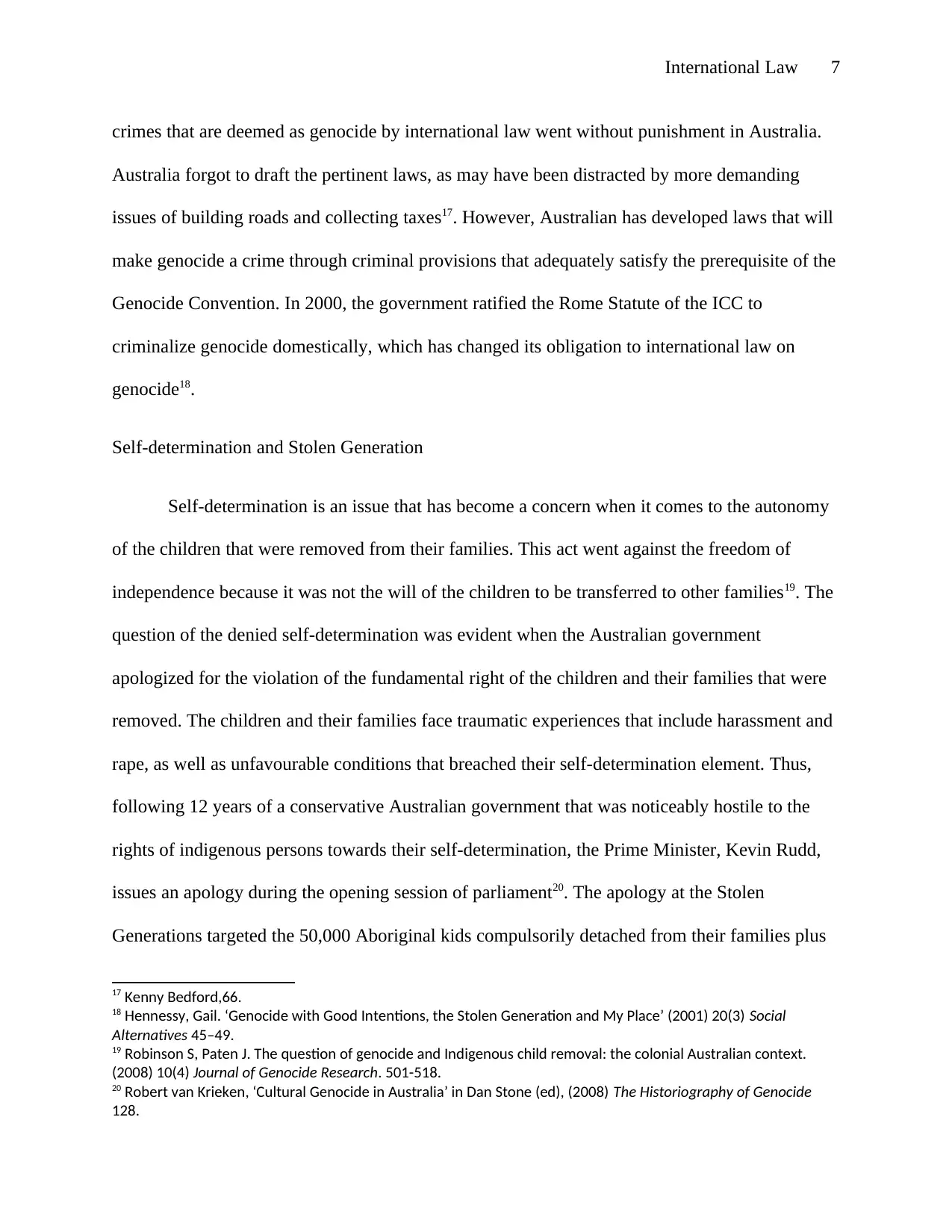
International Law 7
crimes that are deemed as genocide by international law went without punishment in Australia.
Australia forgot to draft the pertinent laws, as may have been distracted by more demanding
issues of building roads and collecting taxes17. However, Australian has developed laws that will
make genocide a crime through criminal provisions that adequately satisfy the prerequisite of the
Genocide Convention. In 2000, the government ratified the Rome Statute of the ICC to
criminalize genocide domestically, which has changed its obligation to international law on
genocide18.
Self-determination and Stolen Generation
Self-determination is an issue that has become a concern when it comes to the autonomy
of the children that were removed from their families. This act went against the freedom of
independence because it was not the will of the children to be transferred to other families19. The
question of the denied self-determination was evident when the Australian government
apologized for the violation of the fundamental right of the children and their families that were
removed. The children and their families face traumatic experiences that include harassment and
rape, as well as unfavourable conditions that breached their self-determination element. Thus,
following 12 years of a conservative Australian government that was noticeably hostile to the
rights of indigenous persons towards their self-determination, the Prime Minister, Kevin Rudd,
issues an apology during the opening session of parliament20. The apology at the Stolen
Generations targeted the 50,000 Aboriginal kids compulsorily detached from their families plus
17 Kenny Bedford,66.
18 Hennessy, Gail. ‘Genocide with Good Intentions, the Stolen Generation and My Place’ (2001) 20(3) Social
Alternatives 45–49.
19 Robinson S, Paten J. The question of genocide and Indigenous child removal: the colonial Australian context.
(2008) 10(4) Journal of Genocide Research. 501-518.
20 Robert van Krieken, ‘Cultural Genocide in Australia’ in Dan Stone (ed), (2008) The Historiography of Genocide
128.
crimes that are deemed as genocide by international law went without punishment in Australia.
Australia forgot to draft the pertinent laws, as may have been distracted by more demanding
issues of building roads and collecting taxes17. However, Australian has developed laws that will
make genocide a crime through criminal provisions that adequately satisfy the prerequisite of the
Genocide Convention. In 2000, the government ratified the Rome Statute of the ICC to
criminalize genocide domestically, which has changed its obligation to international law on
genocide18.
Self-determination and Stolen Generation
Self-determination is an issue that has become a concern when it comes to the autonomy
of the children that were removed from their families. This act went against the freedom of
independence because it was not the will of the children to be transferred to other families19. The
question of the denied self-determination was evident when the Australian government
apologized for the violation of the fundamental right of the children and their families that were
removed. The children and their families face traumatic experiences that include harassment and
rape, as well as unfavourable conditions that breached their self-determination element. Thus,
following 12 years of a conservative Australian government that was noticeably hostile to the
rights of indigenous persons towards their self-determination, the Prime Minister, Kevin Rudd,
issues an apology during the opening session of parliament20. The apology at the Stolen
Generations targeted the 50,000 Aboriginal kids compulsorily detached from their families plus
17 Kenny Bedford,66.
18 Hennessy, Gail. ‘Genocide with Good Intentions, the Stolen Generation and My Place’ (2001) 20(3) Social
Alternatives 45–49.
19 Robinson S, Paten J. The question of genocide and Indigenous child removal: the colonial Australian context.
(2008) 10(4) Journal of Genocide Research. 501-518.
20 Robert van Krieken, ‘Cultural Genocide in Australia’ in Dan Stone (ed), (2008) The Historiography of Genocide
128.
Paraphrase This Document
Need a fresh take? Get an instant paraphrase of this document with our AI Paraphraser
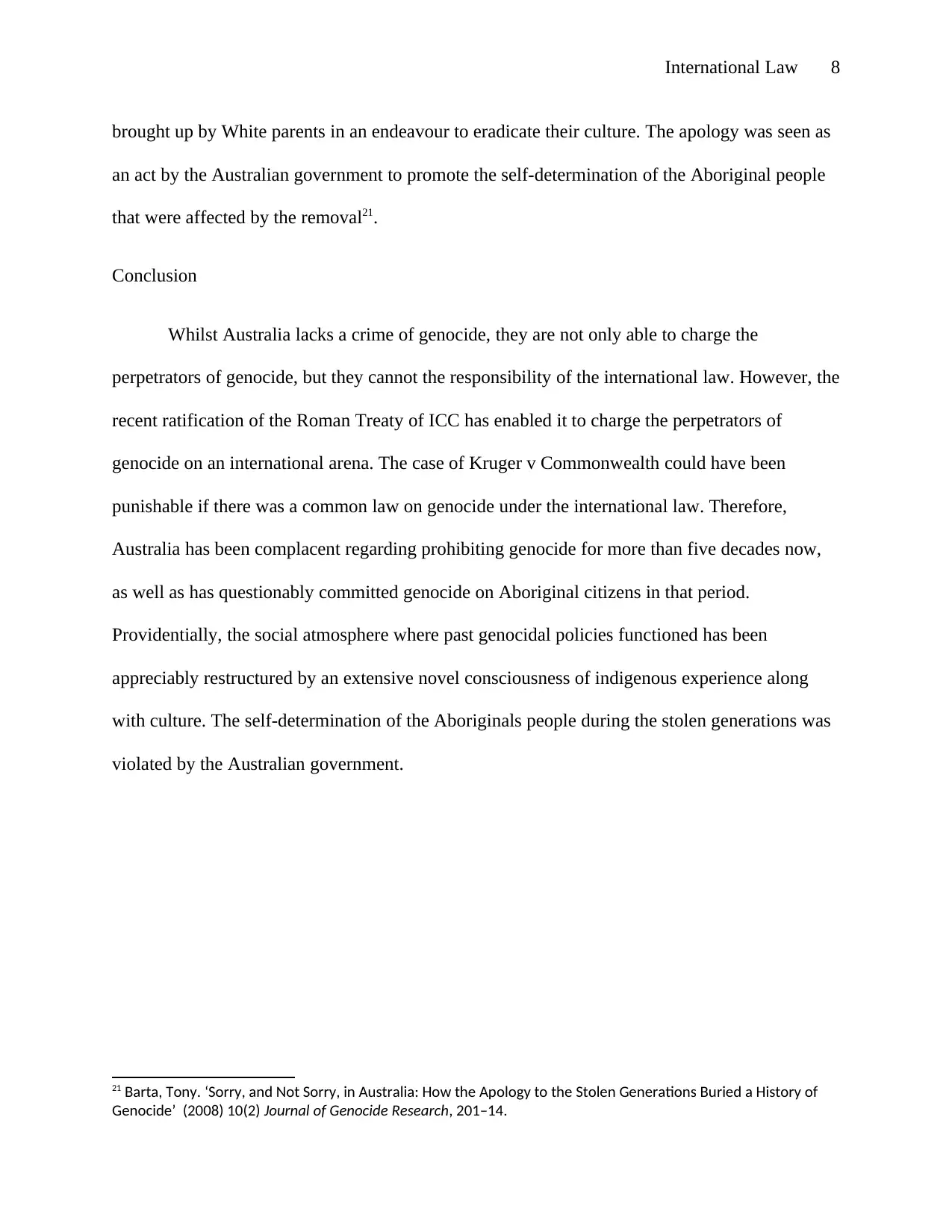
International Law 8
brought up by White parents in an endeavour to eradicate their culture. The apology was seen as
an act by the Australian government to promote the self-determination of the Aboriginal people
that were affected by the removal21.
Conclusion
Whilst Australia lacks a crime of genocide, they are not only able to charge the
perpetrators of genocide, but they cannot the responsibility of the international law. However, the
recent ratification of the Roman Treaty of ICC has enabled it to charge the perpetrators of
genocide on an international arena. The case of Kruger v Commonwealth could have been
punishable if there was a common law on genocide under the international law. Therefore,
Australia has been complacent regarding prohibiting genocide for more than five decades now,
as well as has questionably committed genocide on Aboriginal citizens in that period.
Providentially, the social atmosphere where past genocidal policies functioned has been
appreciably restructured by an extensive novel consciousness of indigenous experience along
with culture. The self-determination of the Aboriginals people during the stolen generations was
violated by the Australian government.
21 Barta, Tony. ‘Sorry, and Not Sorry, in Australia: How the Apology to the Stolen Generations Buried a History of
Genocide’ (2008) 10(2) Journal of Genocide Research, 201–14.
brought up by White parents in an endeavour to eradicate their culture. The apology was seen as
an act by the Australian government to promote the self-determination of the Aboriginal people
that were affected by the removal21.
Conclusion
Whilst Australia lacks a crime of genocide, they are not only able to charge the
perpetrators of genocide, but they cannot the responsibility of the international law. However, the
recent ratification of the Roman Treaty of ICC has enabled it to charge the perpetrators of
genocide on an international arena. The case of Kruger v Commonwealth could have been
punishable if there was a common law on genocide under the international law. Therefore,
Australia has been complacent regarding prohibiting genocide for more than five decades now,
as well as has questionably committed genocide on Aboriginal citizens in that period.
Providentially, the social atmosphere where past genocidal policies functioned has been
appreciably restructured by an extensive novel consciousness of indigenous experience along
with culture. The self-determination of the Aboriginals people during the stolen generations was
violated by the Australian government.
21 Barta, Tony. ‘Sorry, and Not Sorry, in Australia: How the Apology to the Stolen Generations Buried a History of
Genocide’ (2008) 10(2) Journal of Genocide Research, 201–14.
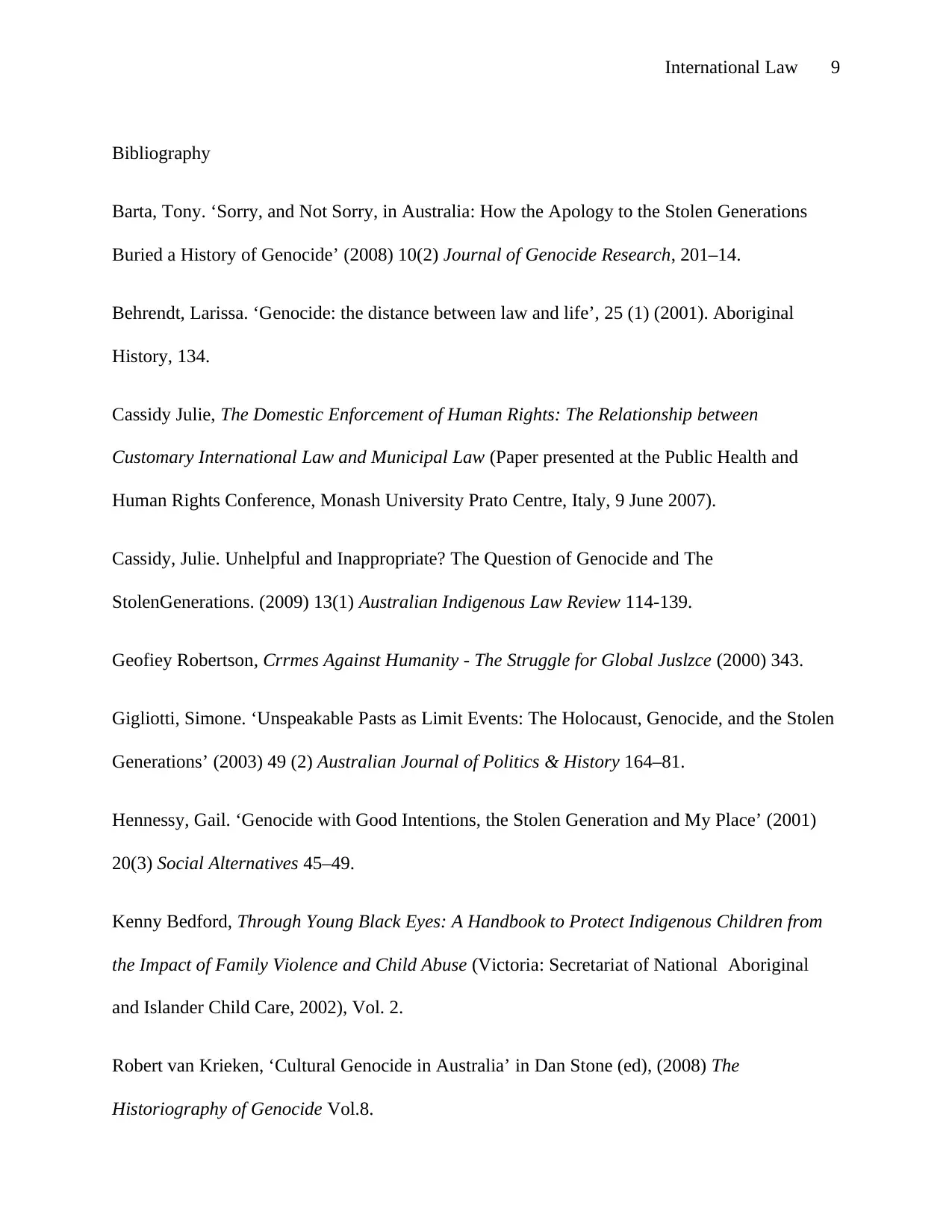
International Law 9
Bibliography
Barta, Tony. ‘Sorry, and Not Sorry, in Australia: How the Apology to the Stolen Generations
Buried a History of Genocide’ (2008) 10(2) Journal of Genocide Research, 201–14.
Behrendt, Larissa. ‘Genocide: the distance between law and life’, 25 (1) (2001). Aboriginal
History, 134.
Cassidy Julie, The Domestic Enforcement of Human Rights: The Relationship between
Customary International Law and Municipal Law (Paper presented at the Public Health and
Human Rights Conference, Monash University Prato Centre, Italy, 9 June 2007).
Cassidy, Julie. Unhelpful and Inappropriate? The Question of Genocide and The
StolenGenerations. (2009) 13(1) Australian Indigenous Law Review 114-139.
Geofiey Robertson, Crrmes Against Humanity - The Struggle for Global Juslzce (2000) 343.
Gigliotti, Simone. ‘Unspeakable Pasts as Limit Events: The Holocaust, Genocide, and the Stolen
Generations’ (2003) 49 (2) Australian Journal of Politics & History 164–81.
Hennessy, Gail. ‘Genocide with Good Intentions, the Stolen Generation and My Place’ (2001)
20(3) Social Alternatives 45–49.
Kenny Bedford, Through Young Black Eyes: A Handbook to Protect Indigenous Children from
the Impact of Family Violence and Child Abuse (Victoria: Secretariat of National Aboriginal
and Islander Child Care, 2002), Vol. 2.
Robert van Krieken, ‘Cultural Genocide in Australia’ in Dan Stone (ed), (2008) The
Historiography of Genocide Vol.8.
Bibliography
Barta, Tony. ‘Sorry, and Not Sorry, in Australia: How the Apology to the Stolen Generations
Buried a History of Genocide’ (2008) 10(2) Journal of Genocide Research, 201–14.
Behrendt, Larissa. ‘Genocide: the distance between law and life’, 25 (1) (2001). Aboriginal
History, 134.
Cassidy Julie, The Domestic Enforcement of Human Rights: The Relationship between
Customary International Law and Municipal Law (Paper presented at the Public Health and
Human Rights Conference, Monash University Prato Centre, Italy, 9 June 2007).
Cassidy, Julie. Unhelpful and Inappropriate? The Question of Genocide and The
StolenGenerations. (2009) 13(1) Australian Indigenous Law Review 114-139.
Geofiey Robertson, Crrmes Against Humanity - The Struggle for Global Juslzce (2000) 343.
Gigliotti, Simone. ‘Unspeakable Pasts as Limit Events: The Holocaust, Genocide, and the Stolen
Generations’ (2003) 49 (2) Australian Journal of Politics & History 164–81.
Hennessy, Gail. ‘Genocide with Good Intentions, the Stolen Generation and My Place’ (2001)
20(3) Social Alternatives 45–49.
Kenny Bedford, Through Young Black Eyes: A Handbook to Protect Indigenous Children from
the Impact of Family Violence and Child Abuse (Victoria: Secretariat of National Aboriginal
and Islander Child Care, 2002), Vol. 2.
Robert van Krieken, ‘Cultural Genocide in Australia’ in Dan Stone (ed), (2008) The
Historiography of Genocide Vol.8.
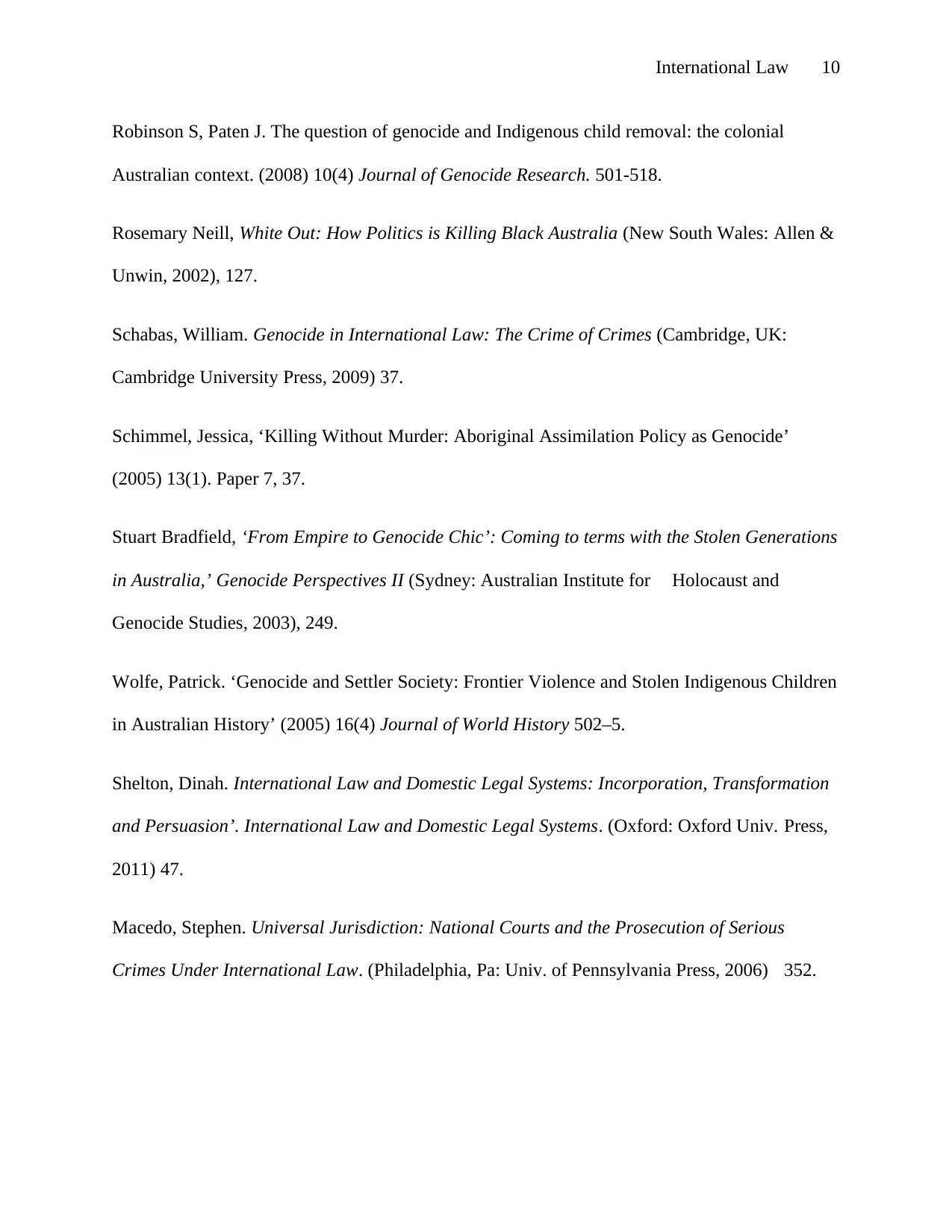
International Law 10
Robinson S, Paten J. The question of genocide and Indigenous child removal: the colonial
Australian context. (2008) 10(4) Journal of Genocide Research. 501-518.
Rosemary Neill, White Out: How Politics is Killing Black Australia (New South Wales: Allen &
Unwin, 2002), 127.
Schabas, William. Genocide in International Law: The Crime of Crimes (Cambridge, UK:
Cambridge University Press, 2009) 37.
Schimmel, Jessica, ‘Killing Without Murder: Aboriginal Assimilation Policy as Genocide’
(2005) 13(1). Paper 7, 37.
Stuart Bradfield, ‘From Empire to Genocide Chic’: Coming to terms with the Stolen Generations
in Australia,’ Genocide Perspectives II (Sydney: Australian Institute for Holocaust and
Genocide Studies, 2003), 249.
Wolfe, Patrick. ‘Genocide and Settler Society: Frontier Violence and Stolen Indigenous Children
in Australian History’ (2005) 16(4) Journal of World History 502–5.
Shelton, Dinah. International Law and Domestic Legal Systems: Incorporation, Transformation
and Persuasion’. International Law and Domestic Legal Systems. (Oxford: Oxford Univ. Press,
2011) 47.
Macedo, Stephen. Universal Jurisdiction: National Courts and the Prosecution of Serious
Crimes Under International Law. (Philadelphia, Pa: Univ. of Pennsylvania Press, 2006) 352.
Robinson S, Paten J. The question of genocide and Indigenous child removal: the colonial
Australian context. (2008) 10(4) Journal of Genocide Research. 501-518.
Rosemary Neill, White Out: How Politics is Killing Black Australia (New South Wales: Allen &
Unwin, 2002), 127.
Schabas, William. Genocide in International Law: The Crime of Crimes (Cambridge, UK:
Cambridge University Press, 2009) 37.
Schimmel, Jessica, ‘Killing Without Murder: Aboriginal Assimilation Policy as Genocide’
(2005) 13(1). Paper 7, 37.
Stuart Bradfield, ‘From Empire to Genocide Chic’: Coming to terms with the Stolen Generations
in Australia,’ Genocide Perspectives II (Sydney: Australian Institute for Holocaust and
Genocide Studies, 2003), 249.
Wolfe, Patrick. ‘Genocide and Settler Society: Frontier Violence and Stolen Indigenous Children
in Australian History’ (2005) 16(4) Journal of World History 502–5.
Shelton, Dinah. International Law and Domestic Legal Systems: Incorporation, Transformation
and Persuasion’. International Law and Domestic Legal Systems. (Oxford: Oxford Univ. Press,
2011) 47.
Macedo, Stephen. Universal Jurisdiction: National Courts and the Prosecution of Serious
Crimes Under International Law. (Philadelphia, Pa: Univ. of Pennsylvania Press, 2006) 352.
1 out of 10
Related Documents
Your All-in-One AI-Powered Toolkit for Academic Success.
+13062052269
info@desklib.com
Available 24*7 on WhatsApp / Email
![[object Object]](/_next/static/media/star-bottom.7253800d.svg)
Unlock your academic potential
© 2024 | Zucol Services PVT LTD | All rights reserved.



